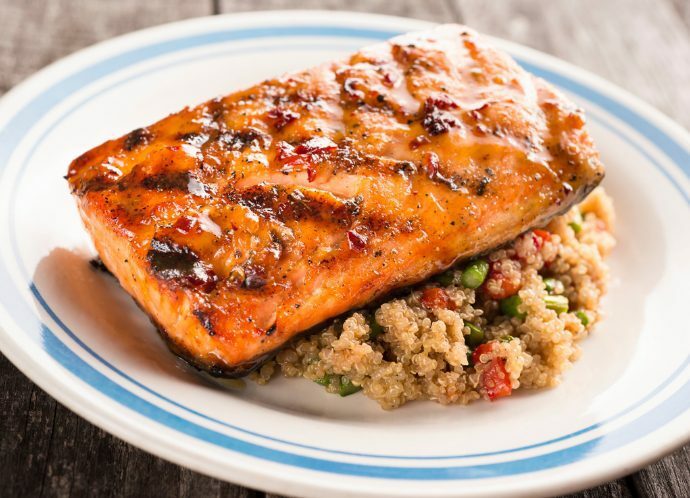Fall In Love with this Heart-Healthy Valentine’s Dinner
February isn’t just about Valentine’s Day; it’s also Heart Month, a time to focus on cardiovascular health. While indulging in a romantic dinner with your loved one is a cherished tradition, it doesn’t have to mean sacrificing your heart health. This Valentine’s Day, why not celebrate with a delicious, heart-healthy dinner that nourishes both your body and your relationship?
CMC Cardiology has some heart-healthy tips for eating out with your Cupid and an easy three-course meal in case you’d like to treat your loved one to a memorable, nutritious candle light dinner at home.
Heart-Healthy Choices When Eating Out
Valentine’s Day often involves indulging in decadent meals, but it’s essential to prioritize heart health, especially when dining out. With some mindful choices, you can enjoy a romantic evening while still supporting your cardiovascular well-being. If you are lucky enough to get the coveted reservation at your favorite restaurant, CMC Cardiology has these tips for making healthy menu choices that will have your heart feeling the love.
1. Choose Lean Proteins:
Opt for dishes featuring lean proteins such as grilled chicken, fish, or tofu. These options are lower in saturated fats and cholesterol compared to red meats like beef or pork. Grilled fish, such as salmon or trout, is an excellent choice as it’s rich in omega-3 fatty acids, which are beneficial for heart health.
2. Load Up on Vegetables:
Fill your plate with a variety of colorful vegetables, which are packed with vitamins, minerals, and antioxidants. Choose dishes that incorporate vegetables as the main focus, such as salads, roasted vegetable platters, or vegetable stir-fries. These options are low in calories and high in fiber, promoting heart health and overall well-being.
3. Watch Portion Sizes:
Restaurant portions tend to be larger than what you might typically eat at home. Be mindful of portion sizes and consider sharing an entrée with your partner or asking for a half portion. Avoid the temptation to overeat by listening to your body’s hunger cues and stopping when you feel satisfied, rather than stuffed.
4. Limit Sodium and Added Sugars:
Many restaurant dishes are high in sodium and added sugars, which can negatively impact heart health. Choose dishes that are prepared with minimal added salt and sugar, and ask for sauces and dressings on the side so you can control the amount you consume. Look for options labeled as “low-sodium” or “no added sugar” when available.
5. Be Smart About Sides:
Choose heart-healthy side dishes such as steamed vegetables, brown rice, or quinoa instead of fries or creamy mashed potatoes. These options are lower in saturated fats and provide valuable nutrients like fiber and potassium, which are beneficial for heart health.
6. Stay Hydrated:
Drink plenty of water throughout your meal to stay hydrated and help aid digestion. Limit your intake of sugary cocktails and sodas, which can contribute to excess calories and sugar intake. If you do indulge in alcohol, opt for a glass of red wine, which contains antioxidants that may benefit heart health when consumed in moderation.
Make the Perfect Heart-Healthy 3-Course Meal
It’s often said that the quickest way to anyone’s heart is through their stomach so cooking something that will nourish you and those you love is a great way to show you care. Believe it or not, you don’t have to sacrifice taste to whip up a heart-healthy meal. CMC Cardiology has the perfect nutritious three-course meal that is easy to make and will titillate your sweetheart’s taste buds.

APPETIZER
Mixed Berry Spinach & Arugula Salad
Start your meal with a burst of flavor and nutrients by serving a mixed berry spinach & arugula salad. Packed with antioxidants, fiber, and vitamins, this vibrant dish sets the stage for a heart-healthy feast. Toss together fresh spinach & arugula leaves, strawberries, blueberries, blackberries, and raspberries, then sprinkle with heart-healthy walnuts or almonds. Drizzle with a balsamic vinaigrette made with olive oil for an extra dose of heart-healthy fats.
MAIN COURSE
Grilled Salmon with Quinoa Pilaf
Salmon is a superstar when it comes to heart health, thanks to its rich content of omega-3 fatty acids. Grilling the salmon locks in flavor without adding extra fat, making it a perfect centerpiece for your Valentine’s dinner. Serve it alongside a quinoa pilaf loaded with vegetables like bell peppers, onions, and spinach. Quinoa is a nutritious whole grain that provides protein, fiber, and essential vitamins and minerals, making it a heart-healthy alternative to traditional rice or pasta.


SIDE DISH
Roasted Asparagus Spears
Asparagus is not only delicious but also a great source of folate, which helps to lower levels of homocysteine in the blood, reducing the risk of heart disease. Simply toss asparagus spears with olive oil, garlic, salt, and pepper, then roast in the oven until tender and caramelized. The result is a flavorful side dish that complements the richness of the grilled salmon perfectly.
DESSERT
Dark Chocolate-Dipped Strawberries
No Valentine’s Day dinner is complete without a decadent dessert, but that doesn’t mean you have to derail your heart-healthy efforts. Dark chocolate is rich in antioxidants and flavonoids, which have been shown to improve heart health by lowering blood pressure and reducing inflammation. Dip fresh strawberries in melted dark chocolate and let them set for a sweet and satisfying end to your meal.

This Valentine’s Day, show your love for yourself and your partner by indulging in a heart-healthy dinner that nourishes your body and your relationship. With these delicious and nutritious recipes and eating-out tips, you can enjoy all the romance of the holiday without compromising your heart health. Here’s to a happy and healthy Valentine’s Day from all of us at CMC Cardiology!
Healthy Hearts with CMC Cardiac Care in Horry County
Your heart creates the rhythm of your life. At CMC Cardiology, our cardiologists are here to help you make the most of it. Known for their compassion and excellence in patient care, our cardiologists help diagnose, manage, and treat heart diseases and conditions. We’re here for every stage of your life and every matter of the heart.




